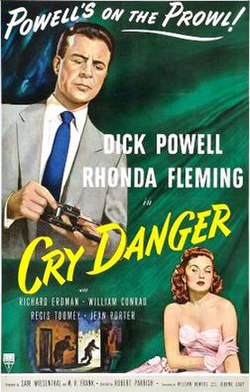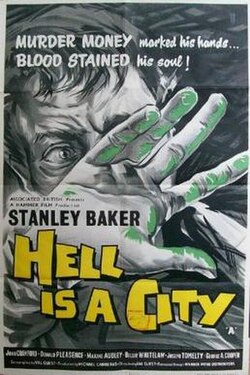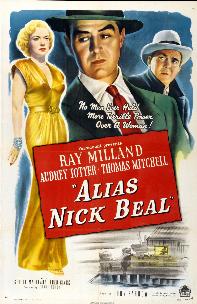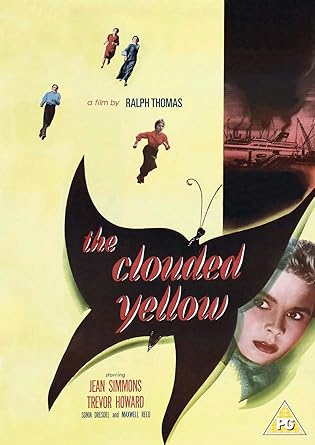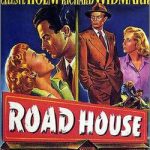
Film Noir Flashback/Road House
December 12, 2024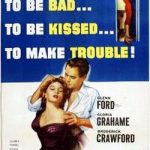
Film Noir Flashback/Human Desire
December 17, 2024I post reviews (Film Noir Flashback) of movies from, and inspired by, Hollywood’s Golden Age of Noir, the 1940s and 1950s. I am a film noir enthusiast. Maybe, like me, you are looking to enjoy films that are of a different era. Films you may not have seen, ones encompassing cynical detectives, seductive femme fatales, flawed sidekicks all tossed together into intricate plots. (Not forgetting the snappy dialogue too).
Backstory: Film Noir has its roots in German expressionist cinematography and American crime fiction. During the 1930s Hollywood became a perfect storm of film artists fleeing the threat of Nazi Germany, emigrating to America, and specifically to the Film studios of Hollywood. This included great directors such as Fritz Lang, Jaques Tourneur, Michael Curtiz and Robert Siodmak.
This new dramatic visual style combined with American hardboiled crime stories (noir fiction), emerged during the Great Depression and produced many classic noirs. Some of these writers include: Raymond Chandler, James M. Cain, Dashiell Hammett, Patricia Highsmith, Jim Thompson and Mickey Spillane.
I hope to showcase some of these memorable noir movies here for you. And advance apologies for a mixture of British and US English occasionally. I have applied the link below, to the Amazon.com DVD of today’s featured film.
Inspired by hardboiled detective stories and film noir, I have written a, Sterling Private Investigator Series, set in present-day London. I have also posted a link to my books at the bottom of the page. For more Film Noir Flashback movie reviews: https://johnkempauthor.com/blog-film-noir-reviews/
Today’s Film Noir Flashback is:
Cry Danger
USA Link: Multi-Format DVD: https://amzn.to/4f26asN
Link: DVD: https://amzn.to/3BKJAaN Blu-ray DVD: https://amzn.to/3BDSqqV
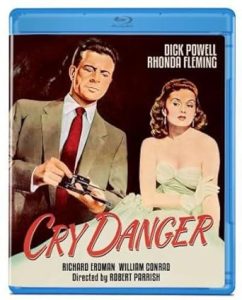
“Try to jump me, I’d like nothing better than shooting you right in the belly.”
Film Studio: RKO Radio Pictures Inc. 1951/B&W
Director: Robert Parrish
Original Music: Paul Dunlap, Emil Newman
Cinematography: Joseph F. Biroc
Film Editor: Bernard W. Burton
Written by: William Bowers, Jerome Cady
Produced by: W.R. Frank, Sam Wiesenthal
Main Actors: Dick Powell, Rhonda Fleming, Richard Erdman, William Conrad
Run time: 79 minutes
Preview
The screenplay was written by Hollywood screen writers, William Bowers and Jerome Cady. The latter famous for, Wing and a Prayer and, Call, Northside 777. The former, Bowers, was a renowned script writer/doctor, and did rewrites on two other noir classics: Pitfall and Criss Cross.
Dick Powell, at this time (1951), had seamlessly transitioned from musicals and comedies to noir detective. The previous years have seen him star in Murder, my Sweet (1944), Johnny O’ Clock (1947) and Pitfall (1948).
Rhonda Fleming had a successful acting career starring in numerous films, including the noirs : Out of the Past (1947), While the City Sleeps (1956), and previous to this film, Alfred Hitchcock’s thriller, Spellbound in 1945.
You may have seen the brilliant Richard Erdman in numerous supporting roles. His acting career spanned seven decades. Maybe, best known for his roles in Stalag 17, and Tora! Tora! Tora! and in later years, the American Sitcom, Community.
There was some discrepancy on the director’s roles (and who did what), in this film. Jean Porter (who plays Darlene), in a later interview said, “The film was directed by Dick Powell and he wasn’t given director credit. Dick gave Robert Parrish the director’s credit, but Dick did all the directing.”
Synopsis
Rocky Mulloy (played by Dick Powell) has been released from prison early. He has served five years of a life sentence for a payroll robbery which culminated in a murder. The sentence has been overturned, in part, by an eye witness: a disabled ex-marine called Delong (wonderfully played by Richard Erdman), who has provided a fake alibi for Rocky.
Now free, Rocky seeks justice for his wrongful conviction and to clear his friend, Danny Morgan (his co-defendant). We follow him as he initially heads to Los Angeles. So begins this mystery tale which serves up two loaded noir-chambers, one with revenge, the other, with humour.
When Rocky arrives at Union Station, he is met by Detective Gus Cobb who already has him under surveillance in efforts to recover the stolen –and still missing loot — to the tune of, $100,000. The detective, is joined by Delong, who turns out to be an opportunistic mercenary. He’s sticking around to share some of that stolen money from the robbery. In Delong’s words, he figures Rocky might be, “grateful” to him for providing that alibi. Or at least pay off his bar bill.
In the bar, Rocky tells them he is innocent and has nothing to do with the robbery, and doesn’t know where the money is hidden. Disappointed, Delong still wants to tag along, which he does. And Cobb leaves too, but continues to observe from the shadows. A wise decision.
Rocky seeks out Danny’s wife, the attractive Nancy Morgan (played by Rhonda Fleming), who is living at a trailer park. Her husband is still in the clink for his part in the robbery of course. Pre-married Nancy was Rocky’s old flame. It’s clear Rocky still has feelings for Nancy, but is respectful, and as he tells his sidekick, Delong, “She is out of bounds.” Though, in reality, Nancy seems ambivalent to whether Danny is freed or not.
Rocky and Delong rent a depleted (and flea-infested) trailer at the same park as Nancy. It’s cheap and nasty and the park manager reluctantly tells them they are welcome to it, as long as they don’t cause any trouble. Ahem, sure thing.
Delong is temporarily deflected from the booze by a shapely part-time model with sticky fingers, called Darlene. Not sure how that’s going to work out but Rocky is still intent on investigating how and why he was stitched up, and by whom. Much of Rocky’s suspicion centres around a beer barrel-shaped guy called Castro, who is a bookie, and a mafia-type figure with fingers in many (crime) pies. You see, five years earlier, Castro offered Rocky a role in the robbery, but he turned it down. Castro, later framed Rocky from the witness stand to save his own hide.
Rocky calculates he is owed $20,000 a year, for each year he was incorrectly incarcerated. Seems fair, give or take. Castro doesn’t pay up but gives him a bent tip on a horse that is guaranteed to pay dividends. It does, but the money is hot (from the payroll robbery), and once again Rocky has been framed. In reality, both him and Castro are in hot soup with Detective Cobb who wants the money back.
Castro wants Rocky dead but he won’t comply (an innocent dies instead, being in the wrong place at the wrong time), and he won’t be deterred. The film culminates in a face-off, or in reality, a “face-up” (involving a game of Russian Roulette), and in turn, a surprising reveal of the whereabouts of the money.
Things to like
There’s lots to love about this hard boiled movie. Dick Powell is in fine form: cool and classy and wise-cracking his way through a quagmire of seediness. He really can deliver a line as they say. William Conrad as Castro plays a great nemesis. And Powell’s sidekick, Richard Erdman (Delong), and Jean Porter (Darlene) add the right amount of gravitas and levity to their roles. Special mention to Rhonda Fleming (Nancy Morgan) who provides the glamour in a noir take on the gangster’s moll.
The trailer park where Nancy and Darlene live is cheap and sleazy and makes for a great setting. Once Rocky moves in too, the sparks, or rather the gunshots, begin to fly. The bullets miss a relieved Rocky alright, but the manager is none too pleased. He has a pit of a trailer park to run.
The crackling dialogue (writer, William Bowers), is up there with the best (see some of the quotes I have posted from the movie below). The exchanges and lines are as sharp as Powell’s suits. And no one delivers them better. (Though, Erdman runs him a close second). The pace is fast and there are no lulls as Powell goes after his man.
Quotes
Rocky: “What about the bartender?”
Delong: “I let him have it over the head with a peanut machine. He’s resting now, in the Emergency Hospital.”
***
Nancy: “What are you using for money these days?”
Rocky: “Well, I’ve got a horse in the 3rd at Burlington, that’s collateral for a bank loan.”
Nancy: “Sometimes they break a leg.’
Rocky: “They got a picture of this one running 1st, before the race even starts.”
***
Darlene: You drinkin’ that stuff so early?”
Delong: “Listen, doll girl, when you drink as much as I do, you gotta start early.”
***
Rocky: “….I’m just here to collect some money.”
Castro: “I only got half. Do you want all of my share?”
Rocky: “That’s cheaper than dying.”
Castro: “Would you kill me, Rocky?”
Rocky: “Wouldn’t you?”
***
Delong, (Before going out with Darlene): “If I’m not back by Tuesday, drag the river.”
Must-see scene
Plenty of great scenes, but the reunion between Castro and Rocky is the most anticipated. Suddenly Rocky is at Castro’s door after having five years of his life stolen. And he thinks he knows who is to blame… The conversation is strained, and, while one of them is worried (what will Rocky do?), the other is seething.
Castro wasn’t expecting to ever see Rocky again. We sense his palpable relief when Rocky says simply, “I’m just here to collect some money”, which in the circumstances, seems pretty decent of him. Though, you sense there will be some sort of retribution if Castro doesn’t share what he knows and where the money is…
During their conversation we learn of a shared past (and we can surmise that Rocky is not as pure as driven snow either). Right here, in Castro’s office, we are in the apex of this crime story and you sense the repercussions will be extreme.
Thankfully, we get to watch them again (Powell and Conrad), in a more violent scene of equal quality. These are two actors at the top of their game. Powell, in particular, with his dry wisecracking repartee, seems born to play these noir roles.
Trivia:
Courtesy of Wikipedia
The film was shot in the Bunker Hill section of Los Angeles. The “Crosley” Hotel, built as the Nugent, stood at 3rd and Grand. The Los Amigos bar was at 3rd and Olive. Clover Trailer Park was not in Bunker Hill, but was at 650-700 N. Hill Place in Chinatown. Also seen is “China City”, a Chinese-themed spinoff of LA’s Olvera Street, no longer extant, 500 feet north of Olvera Strest at Alameda Street.
Summary
Film noir has its stark lighting, its tangled deceitful crime stories, the dream cars, passenger trains and post-war fashion… And critically, those iconic actors from the Hollywood studio system, playing femme fatales, sidekicks and antihero detectives. Then there were the influential directors with their stylized and dark themes of fatalism. What’s not to love.
The defining facet of film noir, I believe, is the humour, and the snappy, rat-a-tat dialogue between adversaries, setting it apart from many modern day films. Cry Danger, is a perfect example of a film balanced with dark overtones and sharp humour. It doesn’t get much better than this.
Cry Danger has many great film noir tropes to enjoy: drive-by shootings, tough talking detectives, deceitful dames and double crosses. So, be warned, you might need a drink and a smoke after this one!
For more Film Noir Flashback movie reviews: https://johnkempauthor.com/blog-film-noir-reviews/
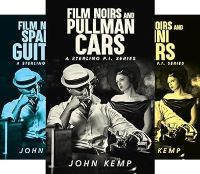
USA Link: Film Noirs & Doused Cigars (paperback): https://amzn.to/4gmuCGq (eBook): https://amzn.to/4fWceEH
UK Link: Film Noirs & Doused Cigars (paperback): https://amzn.to/4gwtErN (eBook): https://amzn.to/4a2DJtZ
****
TMY Mini Projector, Upgraded Bluetooth Projector with Screen, 1080P Full HD Portable Projector, Movie Projector Compatible with TV Stick Smartphone/HDMI/USB, indoor & outdoor use
USA Link : https://amzn.to/4fokEUa
UK Link: https://amzn.to/3ZTO1YR

